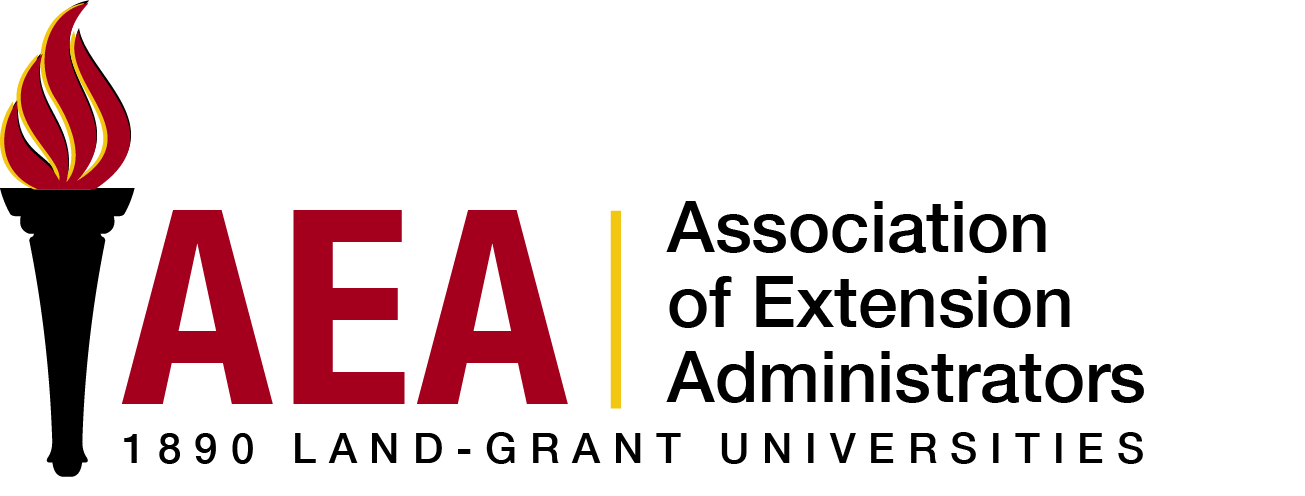Extension Today
News from and about the 1890 Land-Grant Extension SystemMessage from the Chair
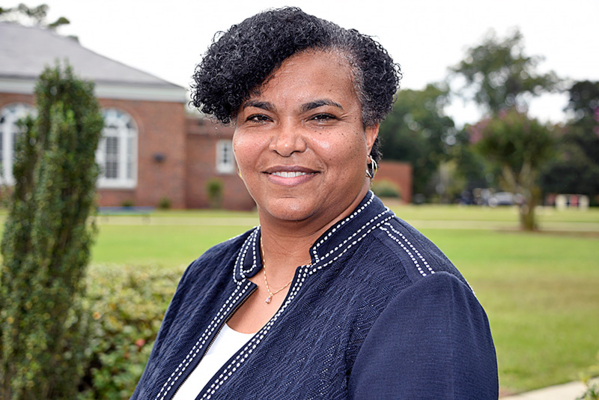
Vonda Richardson, Extension Administrator, Florida A&M University
Happy holidays!
4-H Youth Development programs are the highlight of December’s Extension Today newsletter. These programs throughout 1890 Extension equip young people with the skills they need to succeed in life and are available through local clubs, schools and grant-funded programs.
AEA supports our 4-H leaders, educators and volunteers, as well as celebrates those young people participating in our states, their parents and numerous national, state and local supporters.
In this final issue of 2022, as we close another programming year, we celebrate the innovation and commitment of our 1890 Extension leaders, educators and stakeholders. Best wishes for a joyous holiday season. We look forward to another impactful year in 2023.
Changing the narrative with STEM
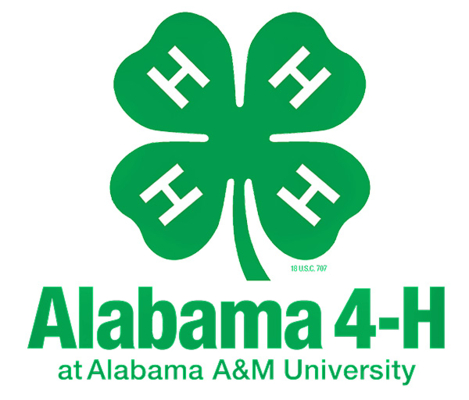
U.S. Deputy Secretary of Education Cindy Marten recently stated that the U.S. Department of Education is “…challenging narratives about who belongs in STEM learning and careers that, over generations, left out millions of girls and young women, students of color, students living in poverty, Native American and Alaska Native students, students with disabilities and other marginalized students.” Alabama Extension at Alabama A&M University (AAMU) is also challenging those narratives.
STEM is the acronym for science, technology, engineering and mathematics, which continues to be a major 4-H program thrust. Alabama Extension also places a strong emphasis on encouraging young people to enroll in 4-H STEM activities and school subjects and to pursue STEM careers. These efforts often involve reaching underserved populations, including minority and female students who do not traditionally pursue STEM education or professions.
In 2022, for example, Alabama 4-H at AAMU enabled 3,028 youth from 31 school districts to attend Virtual STEM Day. Youth were introduced to the engineering design process and created catapults that accurately and consistently launched a projectile into a target or as far away as possible. In addition, the Mobile STEM Lab launched last year introduces youth ages 5 to 18 to real-world and hands-on learning experiences. These initiatives allow the 4-H team to not only reach underserved youth but to inspire the next generation of scientists and technology experts.
Alcorn State University 4-H STEM Challenge
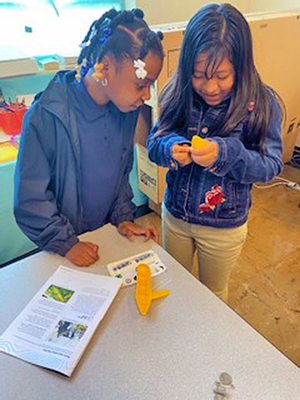
Science, technology, engineering and math (STEM) are the wave of the future. Experts with the Pew Research Center credit technological innovation with almost half of the United States' economic growth over the past 50 years. Nearly all the 30 fastest-growing occupations in the next decade will require at least some background in STEM. The 4-H Science programs are robotics, rocketry, environmental science, computer science, agri-science, biotechnology and veterinary science.
Three two-day 2022 National 4-H STEM Challenge camps titled “Explorers of the Deep” were conducted in elementary, middle and high schools in southwest Mississippi. The challenge focused on the mysteries and adventures of ocean exploration: Ocean Robot Test Tank, Ocean Expedition and Ocean Communicator. The challenge allowed 960 school youth to develop inquiry, observational and problem-solving skills while they make discoveries and develop their STEM identities.
Of the 960 youths participating in this program,79 percent had a new interest in STEM fields and careers and 65 percent were less intimidated by science and technology and eagerly engaged in other events and activities. A two-day 4-H Science program, at most major universities, costs approximately $560 per camper. The 960 youths participating in these camps saved a total of $60,900.
For additional information, contact Manola Erby, youth specialist, Alcorn State University Extension Program, at mcerby@alcorn.edu.
Greene County youth enjoy Central State University Extension 4-H camp adventures
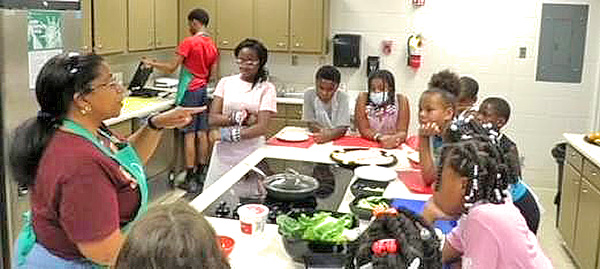
Using their head, heart, hands and health to create memories, Central State University’s 4-H camps continue to be a cornerstone of the youth development program.
Offered free to participants, CSU Extension 4-H camps’ activities range from creating solar-powered model houses to kindness rocks to healthy exercise and improved nutrition. Camps for various age groups are held throughout the state of Ohio and are designed to meet that region’s specific needs.
“4-H not only provides hands-on experiences for participants but also teaches life skills no matter what their future plans,” CSU Extension 4-H Program Leader Dr. Prosper Doamekpor says. “The lessons and experiences are so much more than just what the campers learn. Social and leadership skills can be developed that transfer into all aspects of life.”
For more information, visit www.CentralState.edu/csuextension or CSUE 4-H Coordinator Jodi Black at sblack@CentralState.edu.
The 5 H’s of Beverly C. Banks: Head, heart, hands, health…homegrown!
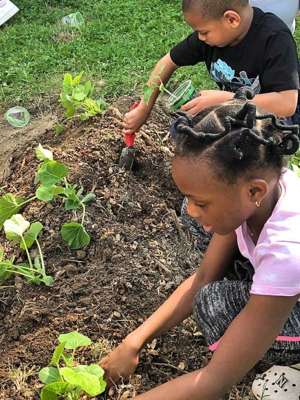
Since its codification in the Smith-Lever Act of 1914, which created the national Cooperative Extension System, and its nationalization in 1924, 4-H has become a ubiquitous model for youth mentoring and experiential learning.
In Delaware, 4-H is one of the collaborative programs under the Delaware Cooperative Extension umbrella, which is the partnership between Delaware State University and the University of Delaware. For the month of December, Delaware State University Cooperative Extension highlights the efforts of 4-H and Youth Development Agent Beverly C. Banks.
Banks was raised with a sense of community. Within her village, she watched as the adults around her who demonstrated care for children were always valued and cherished. From her youth, Banks participated in the Bridgeville pioneers 4-H club that her grandmother, Margaret S. Harris, started in Bridgeville, Delaware.
“When I was growing up, we could not run the streets per se,” said Banks. “We were in a tight-knit community, where parents reached out to us growing up, and they would gather us at their homes and, you know, just have safe, fun things to do.”
Advocating for innovations, technical solutions
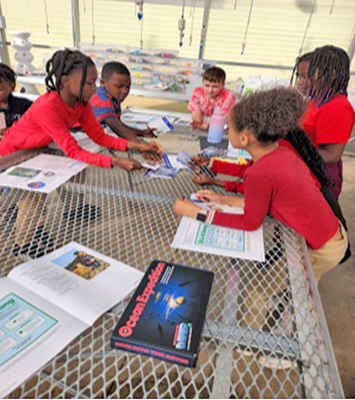
The Fort Valley State University Cooperative Extension 4-H Program received a grant from Bayer to purchase 4-H STEM National Youth Science Day (NYSD) Experiment kits for Chattahoochee Hills 4-H Charter School students.
Bayer purchased the 2022 National 4-H STEM Challenge - Explorers of the Deep NYSD kits for all K-8 students (542) to share and be afforded the opportunity to participate in this 4-H hands-on experiential learning opportunity throughout the month of October during National 4-H Week and Month. Middle school students at Chattahoochee Hills 4-H Charter School also serve as 4-H Tech Changemakers grant project youth ambassadors.
Woodie Hughes Jr. is the FVSU Cooperative Extension 4-H Program’s assistant Extension administrator 4-H program leader. He said the FVSU Cooperative Extension Walmart Foundation 4-H Healthy Habits Nutrition education program continues to feed more than 100 families monthly by providing fresh vegetables for free at the 4-H Village Community Garden Outdoor Laboratory of Learning.
This was made possible through the FVSU Cooperative Extension 4-H Program, grant funding and most importantly, the hard work of Worth County Career Academy High School students and 4-H Village Community Garden adult volunteers on a weekly basis.
Kentucky State University 4-H Youth Development staff welcome students for STEM Challenge

Ten students attended the Explorers of the Deep STEM Challenge program at Kentucky State University’s Rosenwald Center for 4-H Youth Development.
Elementary, middle and high school students from Frankfort, Kentucky, spent three days of their fall break with Kentucky State’s 4-H personnel, completing the STEM-focused kit about adventures of ocean exploration. Students constructed an ocean bot and engaged in a competition to see who could determine the precise weight for their ocean bots to successfully glide through the water.
“This was a great program because it brought awareness to the Rosenwald Center for 4-H Youth Development and Kentucky State University's 4-H Program,” said Casey Townsend, 4-H Extension associate. “It was also an opportunity to provide innovative programming to the Frankfort community and showcase how to conduct engaging educational STEM programs.”
Kentucky State University would like to thank Bayer for its support in the STEM Challenge.
4-H Youth Development Program prepares for Fostering a Goat service project
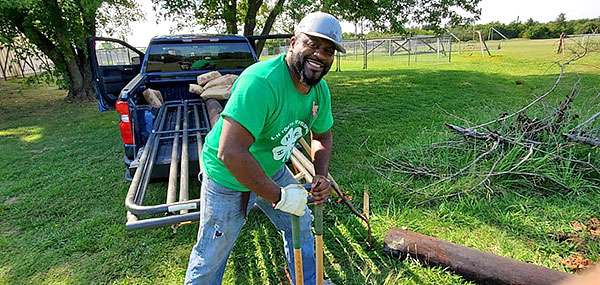
The Langston University 4-H Club, “4 The Hard Way,” members recently collaborated with local and out-of-state community partners to successfully install fencing for the upcoming Animal Husbandry Project. The project expects to be a novel program inspiring the next great generation of farmers and ranchers in Oklahoma.
The “Fostering a Goat” program will offer current and prospective 4-H youth members experience with animal husbandry, including hoof trimming, feeding, shearing and more.
"Engaging strong community partnerships is a large contributor to the success of the project,” stated Jeremiah Wilson, deputy associate Extension administrator-LU-CEOP. Lavell Sims, founder/owner of Life Changes and Wellness in Spencer, Oklahoma, provided the land for the project and Kwame Mboya, Oklahoma City Farmers Market Council, guided clearing and assistance in the fence installation. The Next Step Ministries (Madison, Wisconsin) sponsored the Cherry Hill Christian School youth volunteers from Colorado.
Langston University American Institute of Goat Research (AIGR) will offer a one-year loan of four goats and two sheep and assist in the facilitation of training. Dr. Terry Gipson, associate Extension administrator/goat Extension leader (LU-CEOP), and Dr. Roger Merkel, assistant professor of animal science (LU-SL/DANR), will provide expert training for volunteers in the program. Pledge donations have been received for the purchase of goats for future projects.
Langston University Cooperative Extension & Outreach Programs are sponsored by the LU Sherman Lewis School of Agriculture & Applied Sciences. LU-SL/SAAS continues to be dedicated to reaching underserved youth within the community.
LU Youth Futures Program increases support for youth in juvenile detention centers
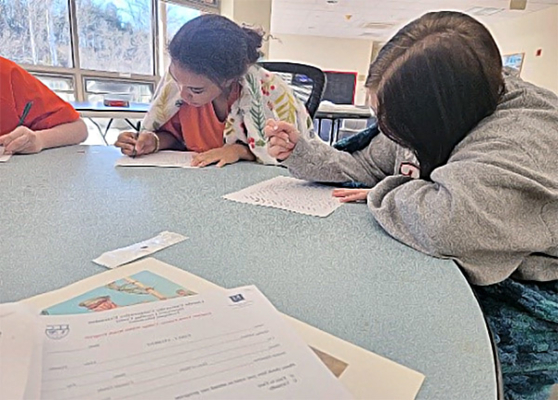
Although there has been a decline in youth incarceration, there has also been a significant increase in Black and white youth in juvenile facilities. Studies continually prove that Black youth are four times more likely to be detained or charged in juvenile facilities in comparison to their white peers nationwide.
Lincoln University Cooperative Extension (LUCE) Central Missouri Youth Development addressed this issue by collaborating with Cole County Michael Prenger Family Center Juvenile Division and providing at-risk youth a network of supportive adults to teach them how to strengthen their sense of identity and self-regulation, as well as their social, emotional, cognitive and behavioral competence through the Lincoln University (LU) Youth Futures Program.
Over the last three years, local educators of LUCE Central Missouri Youth Development have met with youth three times a week allowing them to gain a sense of belonging and trust at the Prenger Family Center. Youth are provided trauma-informed care and are educated on a variety of topics, including adolescent health, goal setting, achievement tracking, leadership skills, conflict resolution, soft skills, social media, entrepreneurship, STEM activities and financial literacy. Through the LU Youth Futures Program, youth are given tools that support healthy choices for a lifetime.
Rockets, teamwork, experiential learning: NC 4-Hers attend Space Camp

Two groups of 4-H youth with Cooperative Extension at North Carolina A&T State University attended NASA Space Camp in 2022 after a two-year hiatus because of the pandemic. The one-week camps are held at the U.S. Space & Rocket Center in Huntsville, Alabama. They give youth the chance to learn robotics, teamwork, leadership and critical thinking skills and experience real-world applications of science, technology, engineering and math.
Jonathan Smith Jr. was one of 16 4-Hers from North Carolina 4-H to attend Space Camp this summer. High school students were there Aug. 7-12, while middle school students, including Jonathan’s younger brother, Keylin, attended July 17-22. Their father, Jonathan Smith Sr., went to both camps as an adult chaperone.
Jonathan Smith Sr. said the experience taught his sons the value of teamwork and learning through experience.
“It was great to see them working together with people they had just met,” he said. “By the end of the week, they had developed strong bonds, and they were able to expand their minds.”
Jonathan Smith Jr. and Keylin earned visits to Space Camp by participating in the 2020 Race to Space competition, held as part of the 4-H Teen LEADS (Learning to Educate Others About Doing STEM) program. Within the next year, they will be required to work with their 4-H agents to reach at least 100 youths with space-related education.
Youth place first in statewide 4-H youth healthy lifestyles cooking competition
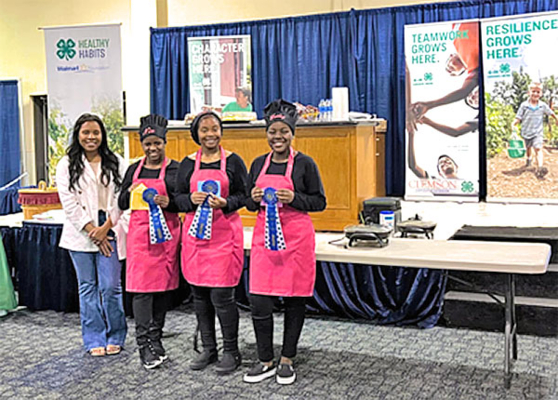
4-Hers Nia Cooley, Whitley Lee and Milyah Alexander demonstrated their outstanding culinary skills at the statewide 4-H Healthy Lifestyles Cooking Challenge at the South Carolina State Fair in Columbia, South Carolina, the previous fall. The trio clinched first place in the competition for demonstrating a clear understanding of and ability to prepare healthy foods.
Kaliyah Woods, 4-H Youth Development agent for Extension Upstate, Nia Cooley, Milyah Alexander and Whitely Lee placed first at the 4-H Healthy Lifestyles Cooking Challenge.
Under the guidance of Kaliyah Woods, 4-H Youth Development SC State 1890 Extension agent, the three-member team prepared a healthy meal consisting of a grilled chicken salad with homemade balsamic vinegar dressing. The team also presented a five-minute presentation on the selected dish.
“I am extremely proud of Whitley, Nia and Milyah on placing first,” said Woods, who provides service in the Upstate Region. “They not only learned new skills in preparing various dishes leading up to the challenge, but they also had the opportunity to shop for each food item themselves and read nutrition labels and determine how to make healthy food choices.”
For the challenge, Cooley, Lee and Alexander were required to work together to decide the meal of choice to prepare, along with developing a presentation on the dish’s serving size and nutritional value. After one hour of allocated time for preparing the meal, the team presented the final dish and presentation to a panel of judges.
Tennessee State University brings 4-H programs to school
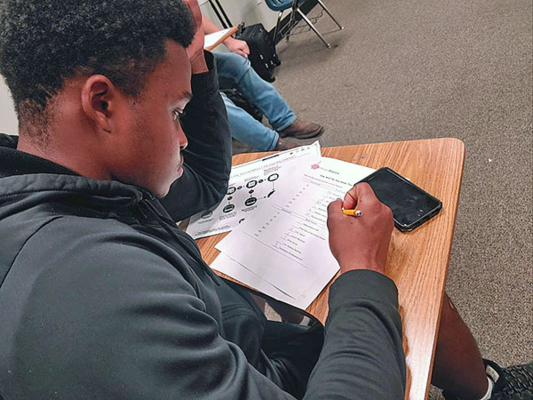
By Thomas W. Broyles
Extension has many delivery modes, and the use of in-school clubs has been the cornerstone of programming for Tennessee State University. 4-H Youth Development agents spend much of their time developing and maintaining relationships with both public and private schools in their communities.
4-H Youth Development agents meet with school officials during the summer to conduct needs assessment data for the coming school year. The agents analyze the data to develop a curriculum for each grade level (primarily 4th and 5th grades), which are currently tied to state education standards. Agents may use history, science and English language arts contexts.
After data analysis, 4-H Youth Development agents meet with each teacher to develop a school year schedule. Typically, the agent conducts three programs in the fall semester and three in the spring.
Through in-school programs, youth learn about the application of content and participate in public speaking and demonstration contests to develop the skill sets employers seek. In addition, the use of the in-school club gains the attention of the youth to hopefully remain in the 4-H program.
Arkansas youth, seniors learn how to fish thanks to fishing derby
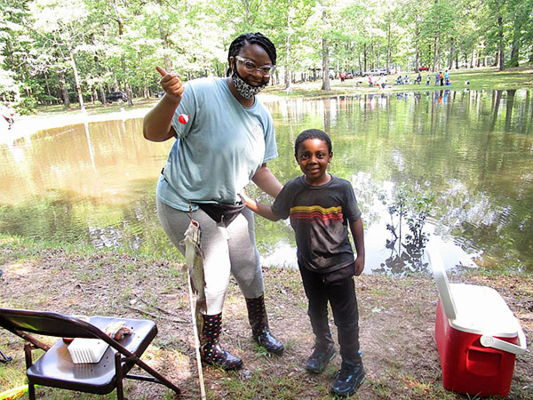
The 4-H Youth Development Program at the University of Arkansas at Pine Bluff (UAPB) co-hosts an annual fishing derby to introduce youth and seniors in southern Arkansas to the recreational activity of fishing.
“Fishing is a great way to bond with family and friends while building an appreciation for the outdoors and natural resources,” Teki K. Hunt, director of UAPB’s 4-H program, said. “Our annual fishing derby is a way to spark an interest in fishing among members of the community. The peaceful time family members spend fishing together often becomes a cherished memory that lasts a lifetime.”
The derby is held on the second Saturday of June during Arkansas’ Free Fishing Week at McCoy Park in Jefferson County, Arkansas. Youth, ages 5 to 16, and seniors, ages 55 and up, learn fishing basics and have the opportunity to try their hand at fishing. At the end of the event, participants visit with each other over lunch.
The project is implemented in partnership with the Jefferson County Recreational Association, a 501(c)(3) community organization, the Arkansas Game and Fish Commission, the Jefferson County Extension Service’s 4-H program and other community donors.
“Fishing is an activity to be enjoyed by all,” Hunt said. “This derby has been a great opportunity for our 4-H program to collaborate with other organizations to get members of the community out in the fresh air to participate in healthy recreational opportunities.”
UMES Extension host youth at annual 4-H STEM Festival
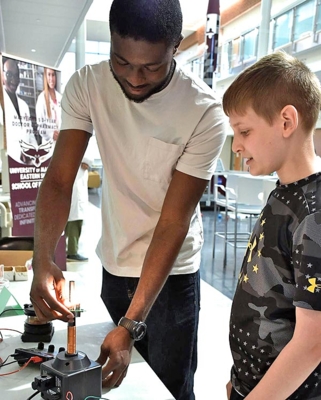
The Engineering and Aviation Science Complex lobby at the University of Maryland Eastern Shore was lined with an interest-grabbing array of interactive activities at UMES Extension’s 4-H STEM Festival on Nov. 12 as part of greater Maryland STEM Festival efforts.
Aimed at getting youth K-12 interested in science, technology, engineering and mathematics, in addition to agriculture, the free event drew 116 participants and their family members. Attendees in a wide age range hailing from the Tri-State area enjoyed hands-on activities and giveaways from some 20 community and campus organizations.
Among those represented were NASA Wallops Flight Facility Education Center, Wicomico County Recreation & Parks, Assateague State Park under the Maryland Department of Natural Resources, the Ward Museum of Wildfowl Art, Worcester County 4-H under the University of Maryland Extension, Somerset County Vocational and Technical High School, Y.E.E.S W.E. C.A.N., and UMES’ School of Pharmacy and Health Professions and departments of Agriculture, Food and Resource Sciences, Computer Science and Engineering, and Natural Sciences, including the student chapter of the American Fisheries Society.
The youth got to look at zooplankton in a microscope, feel shark teeth, operate remote-controlled sphere robots and VEX robots, explore pharmacology, try to eat like a bird, watch a physics demonstration, guess what’s in the box, explore nutrition by making a smoothie on a blender bike and win a strawberry plant by answering a research poster quiz, among other hands-on activities.
WVSU 4-H promotes scientific career paths through Sowing Young Sprouts program
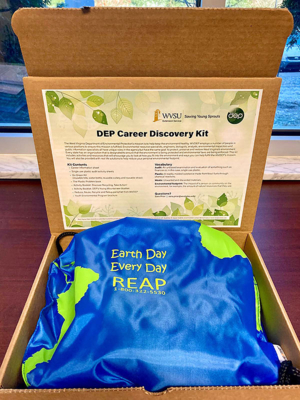
West Virginia State University (WVSU) 4-H’s Sowing Young Sprouts (SYS) program combines inquiry-based science, real-world technology and outdoor education to teach elementary students to become problem-solvers and live a sustainable lifestyle while learning about natural sciences and entrepreneurship.
Additionally, SYS has recently launched an at-home career discovery kit project for children aged 10-12 years old that is available in Fayette, Raleigh, Summers and Wyoming counties. Participants receive hands-on activities and learning resources via mail, allowing them to explore different careers in agriculture and science. Kit topics include meteorology, ornithology and jobs with the WV Department of Environmental Protection (WVDEP) and WV Conservation Agency.
In addition, WVSU 4-H collaborated with the WVDEP to design a “go green” box that educates students on plastic pollution. The kit includes a reusable water bottle, tote, reusable cutlery and reusable straw to help implement positive changes in the children’s daily lives.
The project also coordinates family discovery days where the public can participate in hands-on activities provided by WVSU 4-H and collaborating organizations, such as the Raleigh County Solid Waste Authority and Three Rivers Avian Center.
